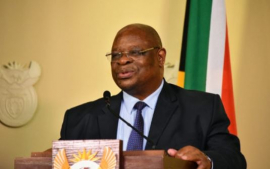
Incoming Chief Justice, Raymond Zondo, says deepening the independence of the judiciary is one of his key targets for his term as leader of the South African judiciary and Chief Justice of the Constitutional Court.
On Thursday, the Acting Chief Justice conducted a wide ranging interview with members of the media.
Zondo is expected to begin his term as Chief Justice at the beginning of April following his appointment to the position by President Cyril Ramaphosa on 10 March.
Due to the 12 year restriction on terms of office for justices of the Constitutional Court, the incoming Chief Justice will be in the position for at least two years – a fact Zondo says he is acutely aware of.
“When I look at what I want to achieve, I’ve got to look at the time I have. I have got to be realistic. I will achieve the things I’ve identified within this period but I will also be seeking to lay the foundation for any other things that may be long term.
“If I could ensure that by the time my term of office ends the judiciary of South Africa has attained that institutional independence, I’ll be very happy because the independence of the judiciary is critical to sustaining our constitutional democracy. We might be here today but at some stage we won’t be here but if we leave behind a judiciary that is truly independent then we can have peace that our democracy will be protected,” the incoming Chief Justice said.
Criticisms of the judiciary
Zondo said although members of society are entitled to have their views on the judiciary, serious allegations of misconduct or criminality – which can be backed up by evidence – on the part of any member of the judiciary should be reported to the Judicial Conduct Committee.
The Judicial Conduct Committee conducts enquiries into complaints against members of the judiciary.
“The allegations that the judiciary is captured are very serious allegations, they should not be made lightly by anybody because it is not in the interest of anybody who loves this country to portray our Judiciary as captured. If anybody has got any evidence that any judge is captured or the judiciary is captured, they must come forward.
“In the past, allegations have been made that there were certain judges who received money in order to decide cases in certain ways. The former Chief Justice [Mogoeng Mogoeng] spoke publicly and said please anyone who has evidence supporting those allegations must come forward. Up to now, I’m not aware of anybody who has come forward with evidence of that. It is wrong to make allegations…when there is no evidence,” he said.
Zondo said criticisms of the judiciary do not necessarily equate to a loss of confidence in the work of the judicial arm of the state.
“I’m not sure that it’s correct to say the people have lost confidence in the judiciary. I think generally speaking, the judiciary enjoys a lot of confidence among the people of South Africa. Of course, there may be some elements of society who, for one or other reason, may have lost confidence.
“But one of the things that I would be trying to do is to send a message that this judiciary that we have is an independent judiciary. It is going to continue to strive to make sure that its independence is respected. It is going to make sure that in making decisions…it does so without fear, without favour, without prejudice,” he said.
The Judicial Service Commission (JSC)
Answering questions on what the future relationship between himself as chief justice and the JSC will be, Zondo said he has full confidence in the commission’s ability to work together.
This after the commission did not recommend Zondo for the position of the next Chief Justice and placed him as the last preferred candidate for the top job.
As Chief Justice, Zondo will be expected to now chair the JSC.
The incoming Chief Justice batted away any insinuations that any tensions or personal disagreements will factor into the committee’s work.
He emphasised that in his work as the Acting Chief Justice over the past nine months, none such tensions have arisen.
“[The JSC] performed their functions in the way they performed them, they made the decisions they have made. When I chair the proceedings, I believe that everybody will be committed to the performance of our functions in a proper manner.
“I have absolutely no doubt in my mind that now that the President has made the decision that he has made, all members of the JSC will work very well with me. I have no doubt in my mind that I will work very well with them,” Zondo said.
The appointment
Turning to the day that he was confirmed as South Africa’s next top judge, Zondo said he was informed directly by President Ramaphosa of his appointment.
Zondo said following this confirmation, his acute awareness of the “responsibility” of the job was heightened.
“I think I felt what I can call the heaviness of the responsibility that comes with this kind of appointment, but I was happy that I was appointed. My mind quickly moved to what might lie ahead and the responsibility that comes with this position.
“I felt honoured because I do think that it’s an honour to be appointed as a judge in the first place. But to be appointed as the chief justice of the country is a special honour. It gives one the opportunity to serve the people in a very special way,” he said. – SAnews.gov.za


